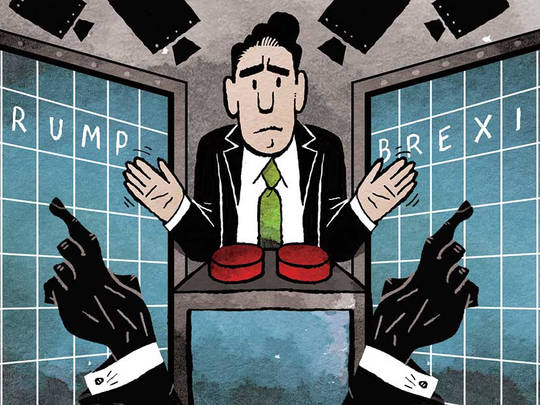
What if the devil came to visit you in the dead of night? What if, dressed in a fine suit, his tail and pitchfork artfully concealed, Lucifer himself offered you a deal?
Knowing the anxiety that was keeping you — a good, progressive type — up at night, he promised that he would grant you one, but only one, of your two deepest current wishes: you could either be sure that Donald Trump would lose the US presidential election or you could be guaranteed that Britain would vote to stay in the European Union. You could have one or the other, but not both. Which would you choose?
The prospect of a President Trump fills the liberal heart with such horror that the temptation to use your Faustian wish to deny a racist, misogynist, bullying fraud the keys to the White House would be intense.
Just think how damaging it would be for the world, and not just the United States, if the most powerful office on the planet were held by such a man. Every two-bit xenophobe, workplace sexist and race-baiting populist would have a role model at the pinnacle of global power. And that’s before you reckon on the ban on Muslims entering the US, the planned deportation of 11 million illegal immigrants and the willingness to use nuclear weapons in both the Middle East and Europe. Surely, the liberal-minded Faust of today would beg the devil to ensure Trump is crushed in November.
And yet, if it were me, I’d hesitate before shaking hands on that with Beelzebub. Sure, a Trump presidency would be a national and international calamity, but there would be a chance to end it in four years.
Brexit is of a different order. If the past is any guide, our next chance to revisit the decision would not be in four years’ time, but in 40. What will be determined on June 23 is not the matter of a single election cycle, but a once-in-two-generations question.
And right now, the country seems ready to answer it with the word leave. And it’s that prospect that has me drawn to striking a deal with the devil. For what will be the consequences of Brexit?
Take the UK itself. You don’t have to believe the Scottish nation is comprised solely of Brussels-crazed federalists to see that if a majority of Scottish voters vote remain while the UK votes leave, there will be new and surely unstoppable pressure for a second independence referendum. Scots will be asked to choose which union they’d rather be part of: a UK on its own, forged in the image of Nigel Farage, or an EU in which several small nations have flourished.
Less discussed, though highlighted by last week’s joint visit of John Major and Tony Blair, is the impact on Northern Ireland. The rest of the UK is far too blithe about peace in that part of the world, bizarrely amnesiac about the 30-year war that claimed thousands of lives, and ended less than two decades ago.
The arrangements there are fragile and delicate. But Brexit would stomp all over them, suddenly transforming the boundary between Ireland’s north and south into a hard border between the EU and the UK. The cavalier assumption that this will have no impact on the precious, hard-won stability of that island is reckless — and all the more shocking coming from people who like to boast that they are patriots and unionists.
But the future viability of the UK is not the reason I’d be tempted to use up my one devilish wish to prevent Brexit. Nor is it the near-certain economic gloom that will befall this country, an outcome so obvious when you take a step back and consider any country voluntarily giving up its right to trade on advantageous terms with a market of 500 million customers.
Story of war and bloodshed
No, the spectre that would haunt me as Satan drummed his fingers, waiting for my decision, would be much more elemental. It is the fear that the European Union, already battered by the Eurozone crisis, simply could not withstand the departure of one of its “big three” members. We would not be tugging at a mere thread but yanking out a guy rope: the EU would collapse — maybe not straightaway, but eventually.
Of course, the EU would do its best to prevent others following us out the door. Perhaps the EU could survive an Estonian, a Maltese or even a Greek secession. But my fear is that just as the EU without France or Germany would unravel, so it will without the UK.
Why should that bother us? We’d be well out of it by then. But remember the history of this continent. The story of Europe is the story of near-constant war and bloodshed.
The 100 years war, the 30 years war, the Spanish wars, the Franco-Prussian wars, the two world wars of the last century: this is what the nations of Europe do to one another — unless they are held together in an arrangement that obliges them to settle their differences around a Brussels conference table, where the most mortal danger is tedium and late-night halitosis. Make no mistake: if the EU’s 27 member states become Europe’s 27 warring nations, we will not be safely detached, serenely distant across the Channel. We will be drawn in, as we always have been.
It takes an extraordinary confidence to look at the last millennium of European history and gamble that the 70 years of peace that have held since 1945 — an exceptional, aberrational interlude — have had nothing to do with the existence of the European project. Do we really think it’s a coincidence that no two EU member states have ever fought each other? Do we want to roll the dice to find out? Do we feel that lucky? So this is the answer I’d give the devil.
Let Britain remain, to prevent the 21st century being as drenched in blood and sorrow as all the European centuries that preceded it. And as for Trump: let’s make another deal in November.
— Guardian News & Media Ltd
Jonathan Freedland is a weekly columnist and writer for the Guardian. He has also published eight books, including six best-selling thrillers, the latest being The 3rd Woman.







